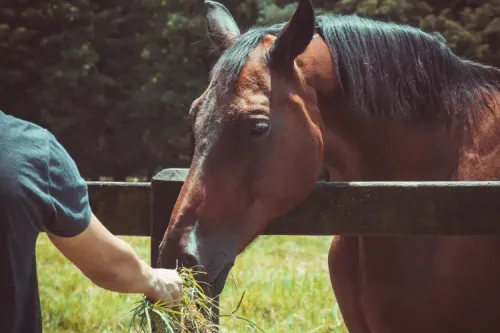
Table of Contents
Owning and caring for a horse is a fulfilling experience, but it can also be financially demanding. However, with smart planning and thoughtful choices, you can manage your horse care expenses without compromising the well-being of your beloved equine companion. In this article, we will explore three key factors that can increase horse care costs and share practical tips to optimize your budget while providing the best care for your horse. Additionally, we'll provide insights into the average cost of owning a horse, both monthly and annually, allowing you to plan your budget effectively.
Average Monthly Cost of Owning a Horse
On average, horse ownership in the UK can cost between £100-£150 per week! That equates to £400-£600 per month. Expenses include feed, veterinary care, bedding, tack, and boarding. Planning your budget is crucial for a successful and fulfilling equine journey. Let's start by looking at a few tips to help mitigate some of these costs and allow you to enjoy horseback riding at a fraction of the cost.
Opt for Professional Services Wisely
Certain aspects of horse care require specialized skills and expertise, and it's crucial not to compromise on these professional services. Quality care from qualified individuals ensures the health and soundness of your horse. Consider seeking professional assistance for the following tasks:
- Veterinary assistance: Regular health check-ups and preventive care are essential for your horse's well-being. Invest in a reputable veterinarian to address any health concerns promptly.
- Farriery work: A skilled farrier will maintain your horse's hoof health, ensuring proper balance and soundness for comfortable movement.
- Saddle fitting: An ill-fitting saddle can lead to discomfort and even injuries for your horse. Consult a professional saddle fitter to ensure your horse's comfort while being ridden.
- Teeth floating/filing: Regular dental care is vital for your horse's overall health and digestion. Engage an experienced equine dentist for this crucial aspect of care.
- Chiropractic needs: In some cases, horses may benefit from chiropractic treatments to address musculoskeletal issues. Seek advice from a qualified equine chiropractor when necessary.
By investing in these essential professional services, you can prevent potential problems that may lead to more significant expenses in the future.
Undertake Manual Stable Duties
Taking on certain stable duties yourself not only helps cut costs but also fosters a stronger bond with your horse. Moreover, actively participating in stable tasks keeps you physically active and engaged with your horse's care. Some manual tasks you can handle include:
- Mucking out your horse's stable: Regularly cleaning the stable keeps the environment sanitary and your horse comfortable.
- Removing field dung: Keeping the pasture clean promotes healthier grazing and minimizes the risk of parasite infestations.
- Cleaning your own tack: Properly maintained tack ensures the safety and comfort of both horse and rider during rides.
- Presenting your horse for professional support: Assisting during veterinary or farrier visits can be beneficial and educational for you and your horse.
If your horse is boarded at a DIY stable, you may be expected to carry out all aspects of your horse's care. In such cases, you can collaborate with other horse owners to share duties, benefiting everyone involved.
Optimize Bedding and Feed Costs
Choosing the right bedding and feed options can significantly impact your budget. Consider the following cost-effective strategies:
- Bulk buying hay and straw: Purchasing hay and straw in large bales can save money, especially when bought in advance or during harvest season. Last year's hay may also be a budget-friendly option for horses with healthy feeding habits.
- Utilizing stable mats: Implementing stable mats reduces bedding usage, allowing you to use only what's necessary for your horse's comfort while making cleaning more manageable.
- Offer your services for full-board reduction: If your horse is boarded on a full-care basis, inquire about the possibility of exchanging part-time work or offering your expertise in exchange for a monetary reduction in boarding fees.
- Share your horse selectively: If suitable, sharing your horse with a responsible and experienced individual can be a cost-saving solution. However, always ensure compatibility and safety, and establish clear expectations for both parties involved.
Conclusion
Caring for a horse on a budget requires careful planning and informed decision-making. Prioritize essential professional services to maintain your horse's health and well-being. Embrace manual stable duties to strengthen your bond with your horse and actively contribute to its care. Optimize bedding and feed options to reduce costs without compromising the comfort of your equine companion.
By adopting these effective strategies, you can ensure that your horse receives the best care possible while managing your expenses responsibly and enjoying a rewarding partnership with your beloved equine friend.

Article Suggestion
How To Soak Hay for Horses
